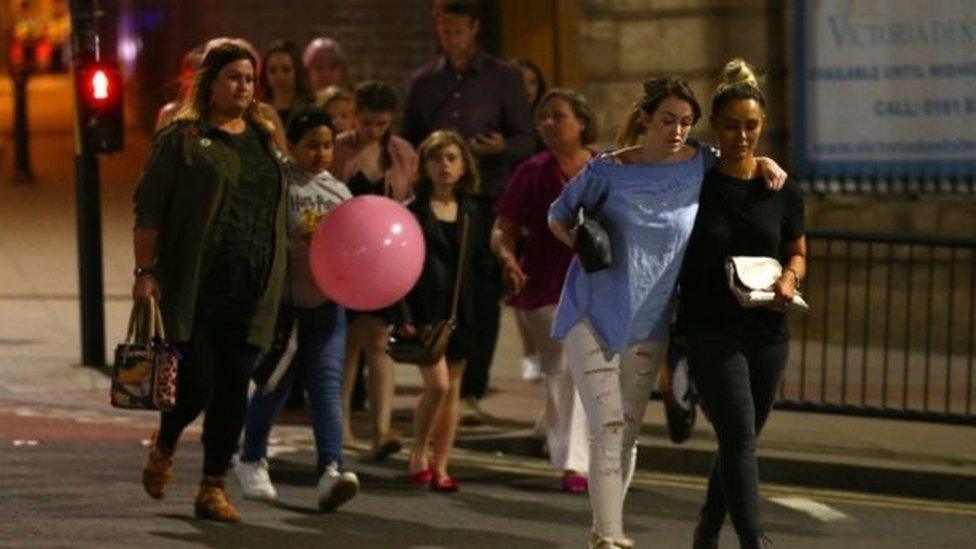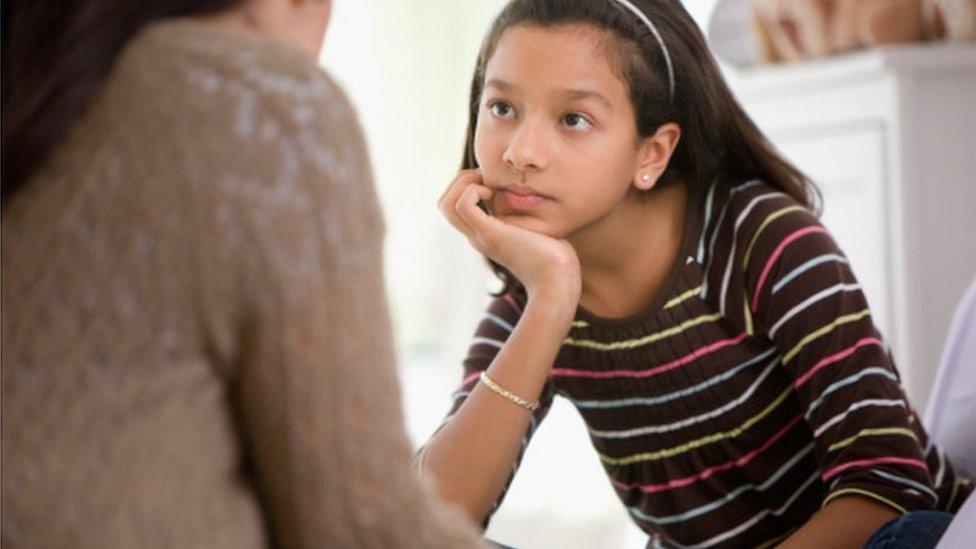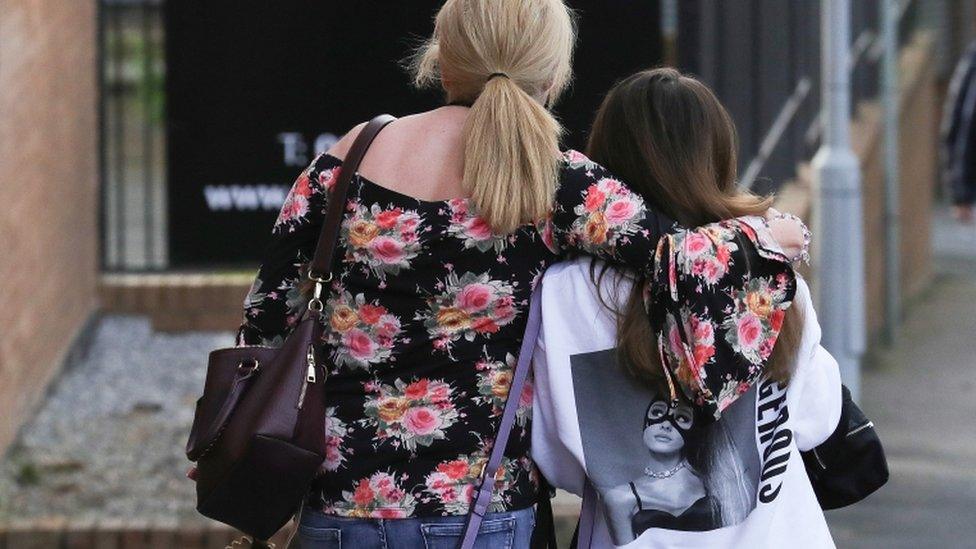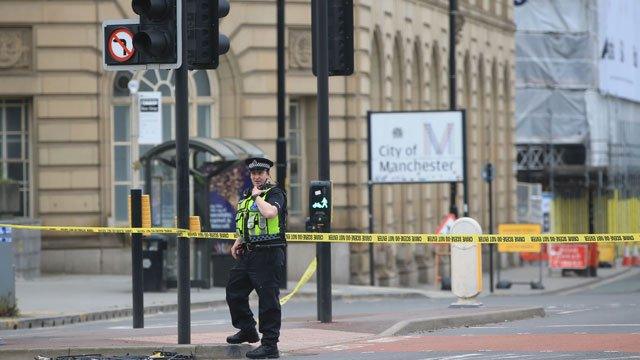How to talk to children about terrorist attacks
- Published

Children and young people were directly affected by last month's attack in Manchester
News of a terrorist attack is always frightening, but for parents there is the added dilemma of what to say to their children.
Should I shield them from the news? Is it best just to turn off the television? Will the images they see traumatise them? Or should I tell my children exactly what's happened?
Talk about the news
The advice from professionals is that talking about these issues is better than avoiding them.
The attack on worshippers near a mosque in north London comes in the wake of that in Manchester, which directly affected many children and young people, and of the attacks on London Bridge and Westminster Bridge.
Consultant clinical psychologist Emma Citron, who specialises in children and trauma, says families should not shy away from talking about such events.
"Give children basic facts, tell them what it is they want to know, ask them what they would like to know and then give them access to that," she says.
"Support them and comfort them and be there for them, hug them, cry with them if they're crying, just respond to how they're responding emotionally.
"Take the lead from them - we need to know what it is they want answers to."
Should I turn off the television?
While turning off the television and radio might be a natural protective instinct, Dr Bernadka Dubicka, from the Royal College of Psychiatrists, says shielding children from traumatic events in the news isn't practical in today's society.
"Parents can't shield children from these events completely," she says. "The reality is that children and young people are bombarded by 24/7 news."
Dr Dubicka says the most important thing is for parents to be there and to try to help their children manage their emotions.
"Trying to hide the news isn't helpful because they'll hear about it elsewhere and parents won't then be there to take them through it."
'Avoid nasty details'
While it's important to talk about the news, parents should avoid unnecessary detail, adds Ms Citron.
"Avoid nasty details, there's no need for them, they're unnecessary.
"You don't want to be describing the scene, describing the bloodshed, describing what it looked like, showing them images - I would be avoiding all of that, because that can traumatise the child."

Ms Citron also advises parents to be firm with older children about how much they read on the internet.
"Tell your young person not to go scouring the internet for all the inside stories, it's just not necessary - we need to protect our young people as well."
Helpful phrases
Ms Citron says parents should take the lead from their children in how the conversation develops, but should try to include as many calm and reassuring phrases as possible.
"General comments like, 'This is a very rare occurrence', 'It's absolutely awful, but thank goodness it's extremely rare', and 'Security is going to be tightened even more', are really reassuring.
"We don't want our children feeling afraid to go out, we don't want them not to grow up to lead normal, happy, healthy, well-adjusted lives."
If faced with the question, "Could this happen again, mummy?", Ms Citron recommends telling the truth, but also giving children lots of reassurance about their normal, everyday activities.
"I would be saying, 'Of course it could' - and don't lie about that - 'But it's very unlikely, these are very, very rare events and we are sure the police are going to up security even more.
"'It'll be absolutely fine to still go to your football or your netball, it'll be absolutely fine to still go on your scout camp', or whatever it is they do.
"'We have to to carry on living our lives in a normal way and not be cowed by these bad people.'"
Will teachers talk about events?
"I'd be surprised if schools weren't giving pupils a chance to talk about the attack," says Geoff Barton, general secretary of the Association of School and College Leaders.
"If students want to talk, teachers will let them ask questions and they will be talking to them about how they can look at appropriate, reliable sources for information."
Mr Barton says schools will also be working hard to emphasise a sense of community cohesion.
"Schools will be wanting to emphasise the sense of community and shared values - they'll be using every opportunity to celebrate what they have in their own community."
But, in his 15-year experience as a head teacher, he says schools will be keeping a "business as usual" approach in the wake of this attack, unless they are directly affected.
"Routines are important and can carry people through - they keep a sense of calm purpose."
How would I know if my child was traumatised?
The signs of trauma depend very much on the individual, however, symptoms to watch for include:
child becoming fearful, clingy and anxious
bedwetting
child becoming preoccupied with thoughts and memories
being unable to concentrate
becoming irritable and disobedient
physical symptoms such as headaches and stomach-aches
If you are concerned about your child and think he or she is traumatised by events in the news, you can approach your GP.
If the problems go on, the doctor may suggest accessing some extra help from the local child and adolescent mental health service (Camhs).
But parents should try not to be overly anxious, as Dr Dubicka says: "The vast majority of young people will cope with this and will be OK."
- Published23 May 2017

- Published23 May 2017
